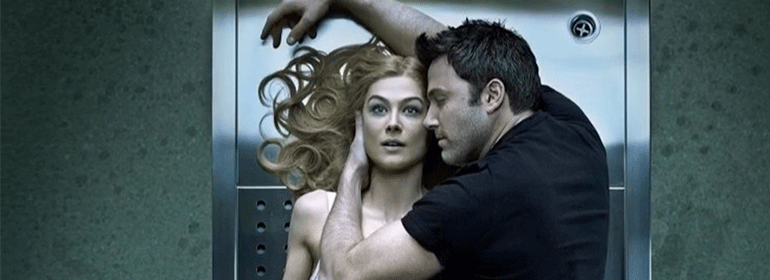With director David Fincher at the helm, the highly anticipated film adaptation of Gillian Flynn’s ‘Gone Girl’ lives up to expectations, says Peter Roche.
Gone Girl, the follow up to David Fincher’s moody adaptation of ultraviolent Swedish crime novel The Girl with the Dragon Tattoo, is a moody adaptation of American crime novel of the same name by Gillian Flynn. The director’s knack for adapting novels started with the 1999 cult favourite Fight Club. The novel Gone Girl was a smash hit upon its release in 2012, and it’s legions of diehard fans expect a very high standard for the film adaptation. So how does it live up to the hype?
Nick (a hulking Ben Affleck) and Amy (a sublime Rosamund Pike) appear to be the perfect couple. Both of them were celebrated writers in New York city before falling victim to the recession and relocating to Nick’s hometown in Missouri to care for his ill mother. The story begins with Nick on the morning of his fifth wedding anniversary; he starts his day with a glass of whiskey in the bar that he runs with his sister, an early indication of the state of his marriage.
Soon its revealed that his wife has gone missing, and before long the eye of the law turns on him. So too does the viewer’s suspicion turn on Nick as we realise that there are two sides to every tale, and that just as his wife was at the start of their marriage we too may have fallen for his charm.
While following Nick’s story in the present, we learn more about the past via excerpts from Amy’s diary. Amy tells of how Nick swept her off her feet, and first kissed her in a sugar storm beside a bakery loading supplies. All very romantic. But just as we can’t fully believe Nick, is Amy infallible either?

Gone Girl is a dark mediation on the nature of human relationships and the manipulative art of storytelling. We all possess carefully crafted personas and exterior identities; the person we see is what they want us to see, not necessarily who they are. The author of the source material, who also worked on the film adaptation, studied the dynamics of long term human relationships and has clearly come away with a bad impression of our species. At one point Nick muses on what he considers the fundamental questions when it comes to relationships “How do you feel? What are you thinking? What will we do to each other?” and the screen fades as Rosamund Pikes gazes out at the audience from behind her mask.
The film succeeds as both a dark drama, and a thrilling pulp film; complete with gratuitous sex and gore. Besides the battery of strong performances, the great triumph comes from the perfect marriage of director and source material. Fincher’s unrelentingly cold vision acts as a magnifying glass on our protagonists deeply flawed characters. A special mention must go out to the score, composed by Trent Reznor (Nine Inch Nails) and Atticus Ross, who’ve worked with David Fincher on his previous two films also; most memorably on the title song for Girl with the Dragon Tattoo which is a cover of Led Zeppelin’s Immigrant Song featuring Karen O.
Unrelentingly bleak, and inseparable from the zeitgeist of our time, Gone Girl is a triumph of form and substance. A uniformly excellent cast draw us in, while Flynn’s screenplay nags at the flaws and dark thoughts lurking behind all of our masks.
Gone Girl hits Irish cinemas October 2
© 2014 GCN (Gay Community News). All rights reserved.

comments. Please sign in to comment.